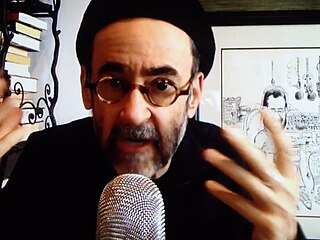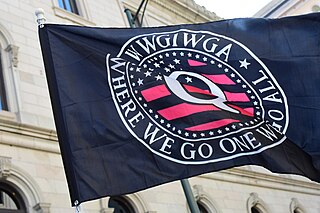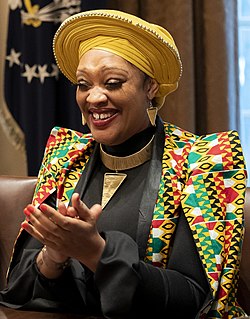
A conspiracy theory is an explanation for an event or situation that invokes a conspiracy by sinister and powerful groups, often political in motivation, when other explanations are more probable. The term has a negative connotation, implying that the appeal to a conspiracy is based on prejudice or insufficient evidence. A conspiracy theory is not the same as a conspiracy; instead, it refers to a hypothesized conspiracy with specific characteristics, such as an opposition to the mainstream consensus among those people who are qualified to evaluate its accuracy.

Michael William Lebron, better known as Lionel, is an American syndicated radio, television and YouTube legal and media analyst. He is known as a leading promoter of the far-right QAnon conspiracy theory.

QAnon is an American far-right political conspiracy theory and movement centered on false claims made by an anonymous individual or individuals, known by the name "Q", that a cabal of Satanic, cannibalistic pedophiles operate a global child sex trafficking ring that conspired against the former U.S. President Donald Trump during his term in office. QAnon has been described as a cult.
Patrick Michael Byrne is an American businessman. In 1999, Byrne launched Overstock.com after leading two smaller companies. Byrne led Overstock as chief executive officer for two decades, from 1999 to 2019. In 2002, Byrne took Overstock public. Early in his tenure he attracted public attention for a long-running legal battle against short sellers and "naked short selling." He eventually resigned as CEO in August 2019, following revelations that he had been in an intimate relationship with Russian spy, and future politician with Vladimir Putin's United Russia party, Maria Butina.

Dominion Voting Systems Corporation is a company that sells electronic voting hardware and software, including voting machines and tabulators, in the United States and Canada. The company's headquarters are in Toronto, Ontario, and Denver, Colorado. It develops software in offices in the United States, Canada, and Serbia.
One America News Network (OANN), also known as One America News (OAN), is a far-right, pro-Trump cable channel founded by Robert Herring Sr. and owned by Herring Networks, Inc., that launched on July 4, 2013. The network is headquartered in San Diego, California, and operates news bureaus in Washington, D.C., and New York City. The company said in 2019 OANN was available in 35 million homes and that its audience ranged from 150,000 to as large as 500,000, though that year Nielsen Media Research estimated its viewership to be about 14,000. Reuters reported in October 2021 that the network was created at the urging of executives of AT&T, which has since been the source of up to 90% of the network's revenues.

GMO conspiracy theories are conspiracy theories related to the production and sale of genetically modified crops and genetically modified food. These conspiracy theories include claims that agribusinesses, especially Monsanto, have suppressed data showing that GMOs cause harm, deliberately cause food shortages to promote the use of GM food, or have co-opted government agencies such as the United States Food and Drug Administration or scientific societies such as the American Association for the Advancement of Science. Critics charge that GMO conspiracy theories are largely promulgated by those opposing the production and sale of GMOs, and instances of unsubstantiated conspiracy theories have lately occurred in the context of public health issues that are mostly unrelated to GMOs, including the 2015–16 Zika virus outbreak and concerns over food safety at Chipotle Mexican Grill.

"Pizzagate" is a debunked conspiracy theory that went viral during the 2016 United States presidential election cycle. It has been extensively discredited by a wide range of organizations, including the Washington, D.C. police.

The Palmer Report is an American liberal fake news website, founded in 2016 by Bill Palmer. It is known for making unsubstantiated or false claims, producing hyperpartisan content, and publishing conspiracy theories, especially on matters relating to Donald Trump and Russia. Fact-checkers have debunked numerous Palmer Report stories, and organizations including the Columbia Journalism Review and the German Marshall Fund have listed the site among biased websites or false content producers.

Marjorie Taylor Greene, also known by her initials MTG, is an American politician, businesswoman and far-right conspiracy theorist who has served as the U.S. representative for Georgia's 14th congressional district since 2021. A member of the Republican Party and a strong supporter of former president Donald Trump, she was elected to Congress in 2020 following the retirement of Republican incumbent Tom Graves.

Angela Stanton-King is an American author, television personality, and motivational speaker based in Atlanta, Georgia. She spent two years in prison for conspiracy and was later pardoned by President Donald Trump. She was the Republican candidate for Georgia's 5th congressional district in the 2020 election, losing to Democrat Nikema Williams after receiving only 14.9% of the vote.

Sidney Katherine Powell is an American attorney and former federal prosecutor, best known for her promotion of conspiracy theories and attempts to overturn the 2020 United States presidential election.

After the 2020 United States presidential election in which Joe Biden prevailed, then-incumbent Donald Trump, as well as his campaign, his proxies, and many of his supporters, pursued an aggressive and unprecedented effort to deny and overturn the election. These efforts culminated in the 2021 United States Capitol attack, which was widely described as an attempted coup d'état.

Ronald Watkins is an American conspiracy theorist and site administrator of the imageboard website 8chan. He has played a major role in spreading the discredited far-right QAnon conspiracy theory, and has promulgated baseless conspiracy theories that widespread election fraud led to Joe Biden's victory over Donald Trump in the 2020 U.S. presidential election. He is the son of Jim Watkins, the owner and operator of 8chan. Some journalists and researchers believe that one or both of the Watkinses know the identity of, or are themselves, "Q", the person or group of people behind QAnon.

QAnon Anonymous (QAA) is an investigative journalism podcast that analyzes and debunks conspiracy theories. It is co-hosted by Travis View, Julian Feeld, and Jake Rockatansky, alongside British correspondent Annie Kelly and Canadian correspondent Liv Agar.

Q: Into the Storm is an American documentary television miniseries directed and produced by Cullen Hoback. It explores the QAnon conspiracy theory and the people involved with it. It consisted of six episodes and premiered on HBO on March 21, 2021. The series received mixed reviews, with some critics praising its insight into the conspiracy theory, and others finding it to be overlong and lacking in analysis of the impacts of QAnon. Some reviewers have criticized the series for not following best practices outlined by extremism researchers for reporting on extremism and conspiracy theories.
Lauren Elena Witzke is an American far-right anti-gay and anti-transgender activist, conspiracy theorist, QAnon supporter, anti-immigrant, former TV show host on TruNews. A member of the Republican Party, Witzke was the Republican nominee for the 2020 United States Senate election in Delaware, but lost by 20 points.
Will Sommer is an American journalist who has been working as politics reporter for The Daily Beast since May 2018. Previously, he was campaign editor for The Hill and a political columnist for the Washington City Paper. In his journalism, Sommer covers the topics of political radicalization and right-wing conspiracy theories in the United States.

Since the movement's emergence in 2018, adherents of the QAnon far-right conspiracy theory have been involved in a number of controversial and violent events, resulting in the filing of criminal charges and one conviction for terrorism.


















